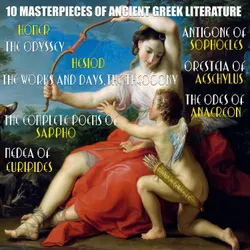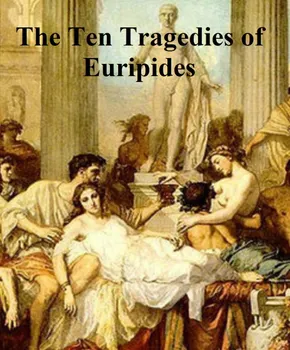This file includes 10 tragedies by Euripides, literally translated by Theodore Buckley. The plays are: HECUBA, ORESTES, PHOENISSAE (The Phoenician Virgins), MEDEA, HIPPOLYTUS, ALCESTIS, BACCHAE, HERACLIDAE, IPHIGENIA IN AULIS, and IPHIGENIA IN TAURIS. According to Wikipedia: "Euripides (ca. 480 BCE–406 BCE) was the last of the three great tragedians of classical Athens (the other two being Aeschylus and Sophocles). Ancient scholars thought that Euripides had written ninety-five plays, although four of those were probably written by Critias. Eighteen or nineteen of Euripides' plays have survived complete. There has been debate about his authorship of Rhesus, largely on stylistic grounds and ignoring classical evidence that the play was his. Fragments, some substantial, of most of the other plays also survive. More of his plays have survived than those of Aeschylus and Sophocles together, because of the unique nature of the Euripidean manuscript tradition. Euripides is known primarily for having reshaped the formal structure of Athenian tragedy by portraying strong female characters and intelligent slaves and by satirizing many heroes of Greek mythology. His plays seem modern by comparison with those of his contemporaries, focusing on the inner lives and motives of his characters in a way previously unknown to Greek audiences."
The Ten Tragedies of Euripides
Teste 30 Stunden kostenlos
- Heute lesen und hören
- Keine Verpflichtungen, jederzeit kündbar

Mach jeden Moment zum Abenteuer
- Trag Hunderttausende Geschichten direkt in deiner Hosentasche mit dir
- Keine Verpflichtungen, jederzeit kündbar

Starten Sie noch heute mit diesem Buch für 0 €
- Hole dir während der Testphase vollen Zugriff auf alle Bücher in der App
- Keine Verpflichtungen, jederzeit kündbar

200 Meisterwerke der Literaturgeschichte : Die größten Klassiker der Weltliteratur
Franz Kafka, Victor Hugo, Fjodor Michailowitsch Dostojewski, Lord Byron, Giacomo Leopardi, Marcel Proust, Henrik Ibsen, Percy Bysshe Shelley, Charles Dickens, Jane Austen, Mary Shelley, Emily Brontë, Charlotte Brontë, Anne Brontë, William Makepeace Thackeray, Bram Stoker, Henry Fielding, George Eliot, William Shakespeare, D. H. Lawrence, Walt Whitman, Herman Melville, Thomas Wolfe, Virginia Woolf, Joseph Conrad, Sinclair Lewis, Lewis Carrol, Edgar Allan Poe, Edward Bulwer-Lytton, Oscar Wilde, H.G. Wells, Daniel Defoe, James Fenimore Cooper, Lew Wallace, Jonathan Swift, Robert Louis Stevenson, Mark Twain, Walter Scott, Nathaniel Hawthorne, Harriet Beecher Stowe, Laurence Sterne, Frances Hodgson Burnett, Arthur Conan Doyle, Wilkie Collins, Edgar Wallace, Jack London, Henry David Thoreau, John Galsworthy, F. Scott Fitzgerald, Rudyard Kipling, G.K. Chesterton, Washington Irvin, O.Henry, Ambrose Bierce, Alexander Sergejewitsch Puschkin, Michail Lermontow, Iwan Sergejewitsch Turgenew, Leo Tolstoi, Nikolai Gogol, Iwan Gontscharow, Nikolai Leskow, Anton Pawlowitsch Tschechow, Maxim Gorki, François Rabelais, Jean de la Fontaine, Blaise Pascal, Pierre Corneille, Moliere, Jean Baptiste Racine, Charles Perrault, Voltaire, Denis Diderot, Jean-Jacques Rousseau, Pierre Ambroise de Laclos, Antoine-François Prévost, Marquis De Sade, François René Chateaubriand, Stendhal, Honoré de Balzac, Alexandre Dumas, Alphonse de Lamartine, George Sand, Gustave Flaubert, Emile Zola, Guy De Maupassant, Alphonse Daudet, Jules Verne, Joris-Karl Huysmans, Prosper Mérimée, Charles Baudelaire, Stéphane Mallarmé, Arthur Rimbaud, André Gide, Arthur Schopenhauer, Heinrich Heine, Friedrich Schiller, Johann Wolfgang von Goethe, Jacob Grimm, Gottfried von Straßburg, Wolfram von Eschenbach, E. T. Hoffmann, Annette von Droste-Hülshoff, Heinrich von Kleist, Friedrich Hölderlin, Theodor Fontane, Gustav Freytag, Gottfried Keller, Theodor Storm, Stefan Zweig, Joseph von Eichendorff, Klaus Mann, Rainer Maria Rilke, Johanna Spyri, Joseph Roth, Karl May, Robert Musil, Heinrich Mann, Sigmund Freud, Friedrich Nietzsche, Dante Alighieri, Giovanni Boccaccio, Giacomo Casanova, Luigi Pirandello, Giosuè Carducci, Gabriele D’Annunzio, Niccolo Machiavelli, Miguel Cervantes de Saavedra, Pedro Calderón de la Barca, Vicente Blasco Ibañez, Knut Hamsun, Homer, Äsop, Herodot, Thukydides, Xenophon, Platon, - Aristoteles, - Sophokles, Euripides, - Aristophanes, Lao Tse, - Konfuzius, Siddhartha Gautama Buddha, Titus Livius, Tacitus, Marcus Tullius Cicero, Vergil, Ovid, Lukian, Petronius, Apuleius, Longos von Lesbos, Mark Aurel, Aurelius Augustinus
book
Medea
Euripides
book
Anti-Helden der Literatur: Klassiker, die man kennen muss : Moby Dick, Faust, Das Bildnis des Dorian Gray, Frankenstein, Jahrmarkt der Eitelkeit, Othello, Die Abenteuer des Huckleberry Finn
Fjodor Dostojewski, Herman Melville, Jack London, Andre Gide, Emily Brontë, Nathaniel Hawthorne, Charles Dickens, Mark Twain, Oscar Wilde, Mary Shelley, Arthur Conan Doyle, Miguel Cervantes de Saavedra, Joseph Conrad, William Makepeace Thackeray, Euripides, William Shakespeare, Johann Wolfgang von Goethe, Homer
book
Die großen Klassiker der Antike : 40+ Bücher in einem Band
Euripides, Xenophon, Homer, Apuleius, - Aristophanes, Laozi, Ovid, - Aristoteles, Platon, Tacitus, Petronius, Cicero, - Konfuzius, Lao Tse, Aurelius Augustinus, Vergil, Titus Livius, - Sophokles, Thukydides, Herodot, Siddhartha Gautama Buddha, - Äsop, Lukian von Samosata, Augustinus von Hippo, Longos von Lesbos, Mark Aurel, Vatsyayana Mallanaga
book
Widerspenstige Frauen in der Literaturgeschichte : Juliette, Tante Lisbeth, Nana, Medea, Sturmhöhe, Madame Bovary, Die Rumplhanni, Anna Karenina
Gustave Flaubert, Dora Duncker, Charles-Louis Philippe, Pierre Choderlos de Laclos, Restif de, Heinrich Vollrat Schumacher, Euripides, Honoré de Balzac, Heinrich Mann, Lena Christ, William Makepeace Thackeray, Emily Brontë, John Cleland, Marquis De Sade, Lew Tolstoi
book
10 Masterpieces of Ancient Greek Literature : The Odyssey, The Works and Days, Theogony, The Complete Poems of Sappho, Medea, Antigone, Oresteia, The Odes of Anacreon
Homer, Hesiod, Sappho -, Euripides, Sophocles, Aeschylus, Anacreon
audiobook
Die großen Klassiker der Antike : 40+ Bücher in einem Band
Homer, Herodot, Platon, - Aristoteles, - Sophokles, Euripides, - Aristophanes, Lao Tse, - Konfuzius, Siddhartha Gautama Buddha, - Äsop, Thukydides, Xenophon, Laozi, Lukian von Samosata, Augustinus von Hippo, Aurelius Augustinus, Longos von Lesbos, Mark Aurel, Apuleius, Vergil, Ovid, Tacitus, Cicero, Titus Livius, Vatsyayana Mallanaga, Petronius
book
Euripides: Medea : Eine griechische Tragödie. Ungekürzt gelesen
Euripides
audiobook
Medea. Eine griechische Tragödie. : Hörbuchzeit: Klassiker der Weltliteratur
Hörbuchzeit, Euripides
audiobook
The Best of the Playwrights: Tragedies and Comedies by the Masters
Euripides, Sophocles, Aeschylus, William Shakespeare, Henrik Ibsen, Anton Chekhov, Bernard Shaw
audiobook
The Best of the Playwrights: Tragedies and Comedies by the Masters. Illustrated
Euripides, Sophocles, Aeschylus, William Shakespeare, Henrik Ibsen, Anton Chekhov, Bernard Shaw
book
Ancient Greek Tragedies. Classic collection : Euripides. Medea; Sophocles. Antigone; Aeschylus. The Oresteia
Euripides, Sophocles, Aeschylus
audiobook
